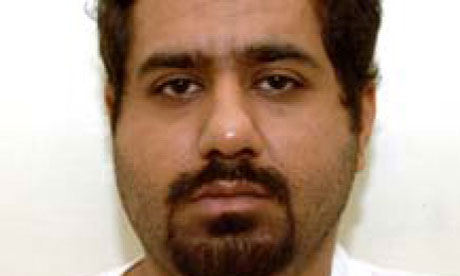Guantánamo Bay files: Star informer freed after implicating 123 prisoners
Mohammed Basardah rewarded despite unsupported claims and interrogators' doubts about sheer number of names he gave up
Mohammed Basardah, who won his freedom after giving testimony that implicated 123 other prisoners.
A star informer at Guantánamo Bay has won his freedom by making statements against at least 123 other prisoners there, according to the camp's leaked archives. The US military describe him as an "invaluable" source who has shown "exceptional co-operation" and shared his "vast knowledge" with the camp authorities.
But lawyers for other detainees have accused him of unreliability – and even some military interrogators began to have doubts as he denounced increasing numbers of his co-prisoners.The Yemeni informer, Mohammed Basardah, has now been released from Guantánamo and transferred to Spain by US request. His whereabouts are unknown. His prisoner file shows that after he confirmed a wealth of new information to interrogators Basardah was reclassified in 2008. His "intelligence value" was upgraded and his classification as a "threat" was lowered.
The camp commander, Rear Admiral David Thomas, then recommended Basardah for "transfer out" of Cuba in August 2008 "based on detainee's exceptional level of co-operation". But he could not be sent home to Yemen. An intelligence analyst noted on his file: "Detainee has reported numerous times that other detainees have threatened to kill him due to his co-operation with intelligence officials."
Testimony from Basardah has helped to keep British resident Shaker Aamer behind bars, despite repeated UK official requests for his return. Basardah "stated he was with [Aamer] in Bin Laden's Tora Bora mountain complex", says his dossier. He went on to describe Aamer as "one of UBL's more significant operatives" and claimed the British resident designed a system of changing radio frequencies during the fighting to avoid interception.
Basardah made equally unsupported allegations against another British resident, Bisher al-Rawi, now released, who was abducted by the CIA in Gambia and rendered to Guantánamo in the hope he would provide intelligence about the London-based cleric Abu Qatada.Basardah claimed the two British residents in Guantánamo were "close friends" and both belonged to Qatada's recruiting cell. He went on to claim that after Qatada was arrested in London, Rawi "broke into his London, UK, home and stole valuable papers allegedly linking [Qatada] to al-Qaida. When confronted by police, detainee reportedly stated he was in the house to repair gas service."
Statements of this kind led the US military authorities to sing Basardah's praises. They reported, according to his detainee assessment, that Basardah "has willingly provided extensive, direct and indirect information about al-Qaida and Taliban training, operations, personnel and facilities and has proved to be an invaluable intelligence source … information which is not available from other sources."He had, they said, "provided extensive information about the personalities and events in Tora Bora including first-hand observations on UBL's role as a leader … has demonstrated a vast knowledge of various individuals and locations in accordance with his reported placement and access. It seems many JTF-GTMO detainees are willing to reveal self-incriminating information to him."
One analyst wrote that Basardah had identified "numerous other detainees" who had fought in the mountains. "The current US government knowledge base of the personnel and activities within Tora Bora would not have been possible without the co-operation and truthfulness of this detainee whose reporting has directly supported US tactical operations in Afghanistan."
Basardah appears to have identified many Guantánamo prisoners from photos. He repeatedly confirms that individuals were Bin Laden's bodyguards, fought at Tora Bora, or trained at al-Qaida's al-Faruq camp. Often he agrees that a particular individual is important or "has met Bin Laden".
Basardah was captured at the end of 2001, in flight across the Afghan border to Pakistan with many of Bin Laden's fighters, who were under bombardment from US air strikes.
But buried in the individual prisoner dossiers are repeated signs that Basardah's information might be unreliable. One says: "In every interview where [Basardah] was questioned on detainee, [Basardah] has changed his story. Detainee's identity as a bodyguard has not been substantiated through other known sources."
Similar notes warn: "Research into the other detainees' timelines does not readily support [Basardah's] information," and: "The single-source [Basardah] reporting of detainee's training and fighting in Afghanistan has not been corroborated."
The intelligence analysts conclude that Basardah's "first-hand knowledge in reporting remains in question. Any information provided should be adequately verified through other sources."
In January 2009 a federal judge ordered a Guantánamo prisoner, Mohammed el-Gharani, to be freed, saying he could not rely on the claim that he was an "extremist fighter" at Tora Bora. District judge Richard J Leon said the Tora Bora allegations against Gharani, who was also found to have been unconvincingly linked to Qatada's "London cell", came from an informer, now identifiable from the leaked prison files as Basardah. The judge, who did not identify Basardah by name in his published judgment, wrote that government personnel had questioned the informer's credibility. The government had "specifically cautioned against relying on his statements without independent corroboration", the judge added. Gharani was released and returned to his native Chad in June 2009.
Basardah is one of a small number of detainees, some of whom were subjected to torture, whose testimony is heavily relied on in the files of numerous prisoners. Testimony from Abu Zubaydah , who was described as the head of an al-Qaida martyrs' brigade intended to operate across Afghanistan, Pakistan and Iran, is referenced in 104 detainee records. Zubaydah's testimony is used to implicate detainees in dirty bomb plots, forgery, and people smuggling, and to contradict detainees' own accounts of their activities years before 11 September 2001.
However, Zubaydah is one of the detainees believed to have been most severely tortured during captivity: an International Red Cross report found he was the only one of 14 high-value detainees subjected to all 12 of the US's "enhanced interrogation" techniques., including at least eight specific identifications of detainees from photographs

No comments:
Post a Comment